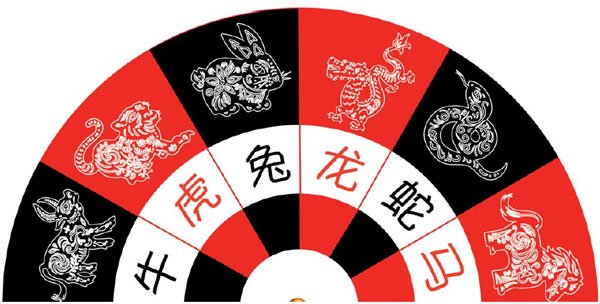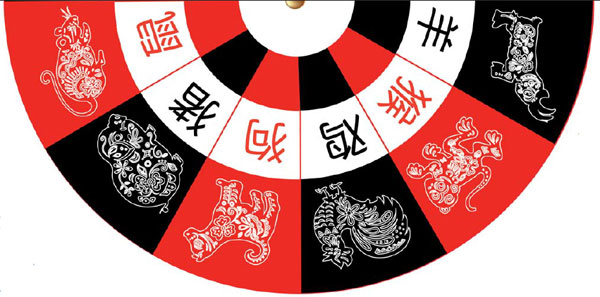Animal attraction
Updated: 2015-02-06 07:41
By David Dawson(China Daily Europe)
|
|||||||||||
How China's zodiac beliefs can affect births and marriages even in a quickly modernizing society
The introduction to Chinese bureaucracy was particularly swift for babies born in Guiyang, Guizhou province, in early November 2014.
When they were scarcely out of the womb, their mothers discovered the hospital had reached its allotted number of birth certificate forms, thus ensuring the very first document to record their existence was denied, or at least delayed.


A boom in births meant that the 70,000 birth certificates set aside for Guiyang (5,000 more than were set aside in 2013) had been reached. New babies had to be given temporary identification papers, which lacked the required optical watermarks and other security measures. The situation resulted in wrangling between local and provincial governments, as well as the National Family Planning Commission, as confusion and bureaucratic red tape stymied efforts to provide birth certificates for these babies.
So, why the sudden boom in births? Media reports on Guiyang's birth certificate crisis were quick to note that the year of the horse was drawing to a close, with the much more unpalatable lunar Year of the Sheep looming on Feb 19, 2015.
Zhang Xiaobo, 27, a white-collar worker in Beijing whose wife gave birth in September, summarized the problem when he says: "My parents persuaded me to have a horse baby, or a monkey baby (referring to children born in the lunar years 2014 or 2016) to avoid the sheep year."
Zhang is of a generation with varied views on the Chinese zodiac, which assigns particular traits to children born each year and labels each year as being related to one of 12 sacred animals. But even young people like Zhang, who take the Chinese zodiac about as seriously as those who read their horoscopes for a laugh, had pressure from relatives who take it very seriously.
The birth of Zhang's baby in September ensured the child was born in the Year of the Horse instead of the Year of the Sheep. "I guess it is probably because the image of a horse is often linked with good stuff, like heroes, loyalty and such," Zhang says.
Views on the benefits and drawbacks of each of the zodiac animals vary across the country. Beliefs related to the animals are often passed down through the generations, and families and villages have their own interpretations. However, certain beliefs are fairly widespread - such as the undesirable status of children born in the sheep year. These people tend to be viewed as kind, gentle, affable and meek but easily manipulated. In a society that has become ruthlessly competitive, a child born with these traits is seen as a liability. This is in stark contrast to those born in dragon or tiger years, who are viewed as go-getters who will bring the family good fortune.
Media outlets such as the China News Service and the Guangzhou Daily, in reference to the extensive criticism of those born in the Year of the Sheep, pointed out that the country's premier, Li Keqiang, was born in a sheep year.
The authorities have good reason to fear these booms and busts, as it is not merely a stable, 12-year cycle China must contend with. Certain years are regarded as particularly auspicious, as each animal also goes through five elements: water, fire, earth, wood and metal, meaning there are, in effect, rotations of 60 years for an animal of one particular element.
In-depth analysis of the Chinese zodiac shows that beyond years there are also animals assigned to months, days and even hours of birth.
In 2007, The Economist reported that officials were expecting a sudden boom in children related to that year, the golden "fire" pig year, which due to other astrological considerations was particularly rare. The commentary pointed out that this boom was prompting fears of education shortages over half a decade in advance.
That same year, China Daily reported on the education problems associated with a previous auspicious year - the year 2000, which was also the vaunted Year of the Dragon. About 36 million babies were born then, according to figures from the National Bureau of Statistics, in contrast to the 19.09 million in 1999 and 17.02 million in 2001.
Primary schools were packed to capacity as the young dragons came of school age, with the Ministry of Education issuing announcements that it would need to take sharp measures to deal with the situation.
Despite the media commentary on potential birth booms or busts, which come around without fail at the start of each lunar year, there are those who say the significance of the zodiac is overstated.
Duan Chengrong, a demographer who is one of the few to research the issue, said in an interview with The Washington Post that while these birth booms are a factor on a smaller scale, on a national scale there doesn't seem to be any discernible effect. He points out that a wide variety of factors affect birth rates, and says the zodiac is just one ingredient among many.
Beyond the day of birth and even after graduation, young Chinese are stalked by their zodiac animals, which even accompany them on dates. Enthusiastic believers in the Chinese zodiac have a wide array of beliefs associated with relationships and matchmaking. Even normally blessed dragons and tigers have certain difficulties here and certainly should not spread their blessings with each other.
"Dragons and tigers should not go together; they will maul each other," one young Beijing local says, requesting anonymity when she also adds that nobody in her family would date or marry someone born in a sheep year, which is also sometimes referred to in English as the goat year. "I would say all my family members try to avoid dating goat people. I remember one case where someone married someone born in the goat year - everyone was against it."
She references a folk saying "十羊九不全" which translates as "nine out of 10 goats' (lives) won't be complete."
"It is meant in the sense of your marriage, which means your marriage won't be stable, or it can mean your career, or it can be in the sense of your fate, as in your destiny, like you would die early," she says.
Although those born in the sheep year get a particularly raw deal, every zodiac animal has other animals it is said to attract or repel. The relationship between the dog and monkey would be described as "volatile" since the monkey could scarcely resist pulling the dog's tale. But the serene ox and the early-rising rooster could easily live a relaxed life together down on the farm. Sometimes it is a bit harder to guess - a monkey's ideal partner may be a snake. In most cases, finding someone who shares the same zodiac animal is seen as the safest bet.
Courtesy of The World of Chinese, www.theworldofchinese.com
The World of Chinese
Animal adjectives
Rat
Ambitious, intelligent, sociable, eloquent; vindictive, cunning, suspicious, critical
Ox
Patient, honest, industrious, dedicated; obstinate, quiet, closed-minded, dull
Tiger
Brave, tolerant, valiant, respected; short-tempered, unsympathetic, hasty, overconfident
Rabbit
Gentle, sensitive, compassionate, amiable; stubborn, impractical, flighty, shallow
Dragon
Strong, magnanimous, noble, dignified; arrogant, tyrannical, dogmatic, demanding
Snake
Communicative, moral, wise, sympathetic; jealous, suspicious, headstrong, fickle
Horse
Clever, kind, perceptive, talented; superficial, short-tempered, pessimistic, wasteful
Sheep
Tender, polite, filial, sensitive; timid, moody, indecisive, weak-willed
Monkey
Intelligent, romantic, quick-witted, curious; vain, deceptive, ruthless, stubborn
Rooster
Introspective, honest, warmhearted, neat; moody, selfish, outspoken, vain
Dog
Straightforward, faithful, courageous, honest; harsh, irritable, anxious, distant
Pig
Nurturing, gallant, honest, practical; naive, impulsive, quiet, short-tempered
(China Daily European Weekly 02/06/2015 page27)
Today's Top News
Chinese FM eyes 'harvest' for ties with Slovakia
Russia leads UN initiative to target IS
New Greek govt lobbies across Europe for solution to its debt
Birmingham plans to transform city into global financial hub
China: Norway violates rights of Chinese scholar
Italy extradites suspect in theft
A great future for UK-China business relationship
Former IMF chief Strauss-Kahn on trial over pimping charges
Hot Topics
Lunar probe , China growth forecasts, Emission rules get tougher, China seen through 'colored lens', International board,
Editor's Picks

|

|

|

|

|

|





